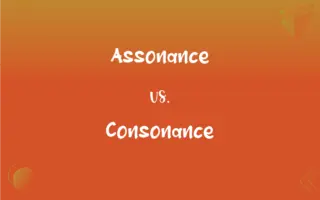Agonist vs. Antagonist: What's the Difference?
Edited by Janet White || By Harlon Moss || Updated on October 21, 2023
An agonist activates a receptor to produce a response, while an antagonist blocks or dampens the receptor's activity.

Key Differences
An agonist and an antagonist both relate to the function and activity of receptors, primarily in the realm of pharmacology and physiology. The agonist is a molecule or substance that binds to a receptor, triggering a response that typically mimics the body's natural actions. For example, certain medications act as agonists by mimicking neurotransmitters in the brain, stimulating certain responses.
In contrast, an antagonist does the opposite. Instead of stimulating a receptor, the antagonist binds to it, blocking or reducing its activity. This often prevents a certain action or response from occurring in the body. Many drugs are designed as antagonists to reduce overactivity in certain body systems or to combat the effects of harmful substances.
The relationship between an agonist and an antagonist can be compared to a key fitting into a lock. The agonist is a key that fits perfectly, unlocking the door and activating a response. The antagonist, on the other hand, might be a key that fits into the lock but doesn't turn, preventing other keys (agonists) from unlocking the door.
One can also think of the agonist as the accelerator in a car, pushing a process forward, whereas the antagonist acts as the brake, slowing down or stopping a process. This balance between agonist and antagonist activity is essential in maintaining the body's homeostasis and responding to various stimuli.
Whether in the realm of medicine, physiology, or even in literary contexts, understanding the dynamic between an agonist and an antagonist provides insight into the balance of action and counteraction. Their interplay is crucial in a variety of systems and narratives.
ADVERTISEMENT
Comparison Chart
Action
Activates a receptor
Blocks or dampens receptor activity
Purpose
Mimics natural actions or induces responses
Prevents or reduces actions
Effect
Stimulatory
Inhibitory
Example in Medication
Drugs that mimic neurotransmitters
Drugs that block harmful substances
Analogy
Key that turns and unlocks a door
Key that fits but doesn't turn
ADVERTISEMENT
Agonist and Antagonist Definitions
Agonist
A compound mimicking natural molecule actions.
Nicotine is an agonist that stimulates acetylcholine receptors.
Antagonist
A molecule preventing receptor activation.
Naloxone is an antagonist for opioid receptors.
Agonist
A molecule triggering receptor action.
Morphine acts as an agonist on opioid receptors.
Antagonist
An entity opposing or inhibiting specific processes.
During a bicep curl, the triceps serve as the antagonist muscle.
Agonist
A chemical activating receptor functions.
Certain painkillers are agonists that reduce the perception of pain.
Antagonist
A substance hindering physiological effects.
Beta-blockers act as antagonists in the heart.
Agonist
A substance initiating a physiological response.
Some asthma medications serve as bronchial agonists.
Antagonist
A chemical dampening or inhibiting receptor functions.
Some hypertension drugs are calcium channel antagonists.
Agonist
An entity promoting or activating specific processes.
In weightlifting, the biceps muscle is the primary agonist during a curl.
Antagonist
A compound counteracting another substance's actions.
In certain allergies, antihistamines work as histamine antagonists.
Agonist
(Physiology) A contracting muscle that is resisted or counteracted by another muscle, the antagonist.
Antagonist
One who opposes and contends against another; an adversary.
FAQs
How do antagonist drugs benefit patients?
Antagonists can inhibit harmful or excessive responses, beneficial in conditions like hypertension.
How does an antagonist function differently from an agonist?
An antagonist blocks or inhibits a receptor's activity, preventing or dampening a response.
What does an agonist do in the body?
An agonist activates specific receptors, triggering a physiological response.
Why are agonists important in medicine?
Agonists can mimic or enhance natural body functions, often used to treat deficiencies or disorders.
Is it true that muscles work in agonist and antagonist pairs?
Yes, when one muscle (agonist) contracts, its opposing muscle (antagonist) relaxes.
Are agonist drugs always beneficial?
No, while many agonists have therapeutic benefits, misuse or overuse can lead to side effects.
Can the body develop resistance to agonists?
Yes, with prolonged exposure, receptors may become desensitized, reducing the agonist's effect.
Are all agonists synthetic?
No, while many therapeutic agonists are synthetic, the body also produces natural agonists.
Is it true that agonists and antagonists can be used together in therapy?
Yes, combining agonists and antagonists can optimize therapeutic effects and reduce side effects.
Can a drug act as both an agonist and an antagonist?
Yes, some drugs can have mixed agonist and antagonist effects on different receptors.
Are there natural agonists in the body?
Yes, neurotransmitters and hormones can act as natural agonists for specific receptors.
Can an antagonist be used to reverse the effects of an agonist drug?
Yes, antagonists can often counteract the effects of agonists, like naloxone reversing opioid effects.
What's a competitive antagonist?
A competitive antagonist competes with an agonist for receptor binding, potentially blocking its effects.
Is dopamine an agonist?
Dopamine is a neurotransmitter that can act as an agonist for dopamine receptors.
What is a non-competitive antagonist?
A non-competitive antagonist inhibits receptor activity, but not by competing for the same binding site as an agonist.
Can an agonist and antagonist coexist in a system?
Yes, in many systems, agonists and antagonists coexist, balancing and modulating responses.
Do antagonist drugs have side effects?
Like all drugs, antagonists can have side effects depending on dosage, duration, and individual factors.
How are agonists different from partial agonists?
While agonists fully activate receptors, partial agonists only partially activate them.
Can antagonists be harmful if used incorrectly?
Yes, inappropriate use of antagonists can inhibit necessary body functions or cause adverse reactions.
Why are antagonists used in allergy medications?
Antagonists can block the effects of substances like histamines, reducing allergy symptoms.
About Author
Written by
Harlon MossHarlon is a seasoned quality moderator and accomplished content writer for Difference Wiki. An alumnus of the prestigious University of California, he earned his degree in Computer Science. Leveraging his academic background, Harlon brings a meticulous and informed perspective to his work, ensuring content accuracy and excellence.
Edited by
Janet WhiteJanet White has been an esteemed writer and blogger for Difference Wiki. Holding a Master's degree in Science and Medical Journalism from the prestigious Boston University, she has consistently demonstrated her expertise and passion for her field. When she's not immersed in her work, Janet relishes her time exercising, delving into a good book, and cherishing moments with friends and family.































































